Gulp.
[fuzzy awakening sounds] “I said the game could take 5 or 6 hours. What do you think?”I was listening to my friend Jacob tell me about his love affair with 18XX games, the long-running series of economic “train games.” These games are legendary for two reasons: the games are an eyesore (and that’s being polite) and they are crazy long. Almost everything I had read about 18XX games led me to believe games would last at least one hour per player, and that games were best with 4-5 players.
That, plus a teach for games loaded with rules, meant at least five hours sitting at the table for a single game.
Oh, boy. I have a job, kids, a wife and a life! It’s pretty hard for many of my friends to even play games these days, let alone long ones that often have to be played during the daytime on a weekend. Suffice it to say, I’ve got a lot of built-in challenges for an endeavor like this one.
But I wanted to see for myself. I’m on a mission in 2023 to embrace playing longer games once or twice a month, and 18XX games offered the perfect chance to get comfortable getting…uncomfortable. For years, I’ve been turning down chances to play 10-hour civilization games and 12-hour Twilight Imperium games and multi-day role-playing games.
Even though I’m at the beginning of my 18XX journey, I can already report happy returns. 18XX games are quite an investment, but I’m already starting to see why people adore the system so much.
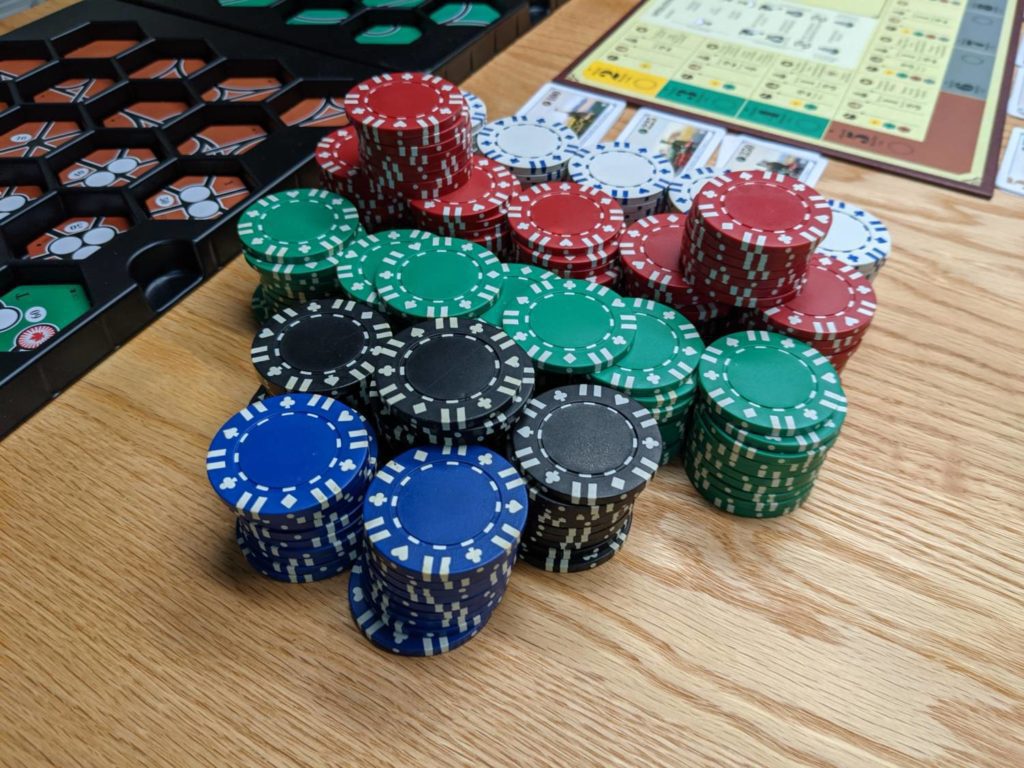
18XX: A Brief History
British game designer Francis Tresham is credited with the first game in the 18XX system, with his release of 1829 back in 1974. About ten years later, 1830: Railways and Robber Barons was released in multiple countries and created openings for a system that still sees new games released every year, both independently and by publishers such as Lookout Games, GMT Games, Grand Trunk Games, and All Aboard Games.
Most 18XX game titles start with a name like 18_ _, like 1889 (soon to be re-released as Shikoku 1889), 1861, or 1817. Others start with 18 then finish with a multi-letter or full word reference to call out its setting, such as 18Chesapeake or 18MS (for 18 Mississippi). A limited number of 18XX games deal with futuristic settings, but most 18XX games are set in the past.
Games in the 18XX system use many of the same foundational elements, then provide tweaks to each game based on the preferences of individual designers. All the games I have tried position players as independent investors in transportation businesses, typically the real-world railroad corporations of the 1800s. Keeping personal money separate from corporation money is always a tricky thing to remember, because as games progress, players find themselves not only as investors, but also as the President of one or more railroad corporations.
Players typically participate in the purchase of private companies that represent smaller interests that had regional advantages that were later absorbed by larger railroad corporations. A distribution of these “privates” usually serves as the initial stage of play. Sometimes, these private companies are purchased via an auction; in other 18XX games, privates are drafted.
For a gamer, particularly a person who loves variable player powers, privates are a fun way to help steer early-game strategy, particularly in an environment where the long-term implications of every move are massive.
Most 18XX games alternate between a stock round and anywhere from one to three operating rounds. In stock rounds, players get to wheel and deal, starting corporations, buying shares in their own or opponent corporations, selling shares to fund further interests. With limits on the number of certificates that can be held at a given time, there’s always a nice tension to deciding when and what investments to make at just the right time.
Operating rounds give players the chance to lay track and run imaginary trains. As much as I enjoy a great economic game, my passion for the 18XX system comes from finding the most profitable ways to run trains from city to city (or town to city, or city to “off-board locations” that the board’s map can only hint at with red sections due to space limitations).

That magic occurs because of a limited supply of trains that can be bought by the railroad corporations in play. Trains typically have a number, like “2-Train” or “4/6 Train.” This number represents the number of named locations it can stop at to earn its owner revenues in a round. The larger the number, the better the train. In the case of a train that has a “N/M” format, a train could stop in a total of M cities, cherry-picking the N most profitable ones to hit along the way.
Trains will get pretty expensive by the end of play! Trains represent the progress of time, so you can only buy the least advanced trains when play begins. Over the course of many rounds, trains get better, but the purchase of newer trains advance the course of play and also “rust” older trains into obsolescence.
This means that players have to run a profitable business, one that pays dividends on a regular basis to shareholders. Those same players, as corporation Presidents, have to also make sure they don’t get caught with their pants down when their current trains are pushed out of service when their trains are rusted out of the game.
Even before playing an 18XX game, I had heard the term “train rush”, and now that I’ve played a few, I can confirm that this is quite a rush—both as a rush to buy a limited resource, and as an adrenaline rush. Man, is it fun (stressful?) to make sure you have the right amount of trains before any single type of train runs out!
Every 18XX game that I have tried ends the same way: at the end of a set number of operating rounds, or when either the game’s bank “breaks” (runs out), or when one or more players goes bankrupt. (18XX games have the decency to know that no one wants to watch a five-hour game from the sidelines.) No matter who wins, I’ve always enjoyed building a business from scratch and seeing my personal wealth grow exponentially over the course of the game.
Starting with $300 or $400, then ending a game with 10x, 20x or more in personal wealth, is a really nice feeling. That might still mean that I lost by a ton of cash, but to build something, and see the fruits of that, has really put a shine on why these games work for so many players.
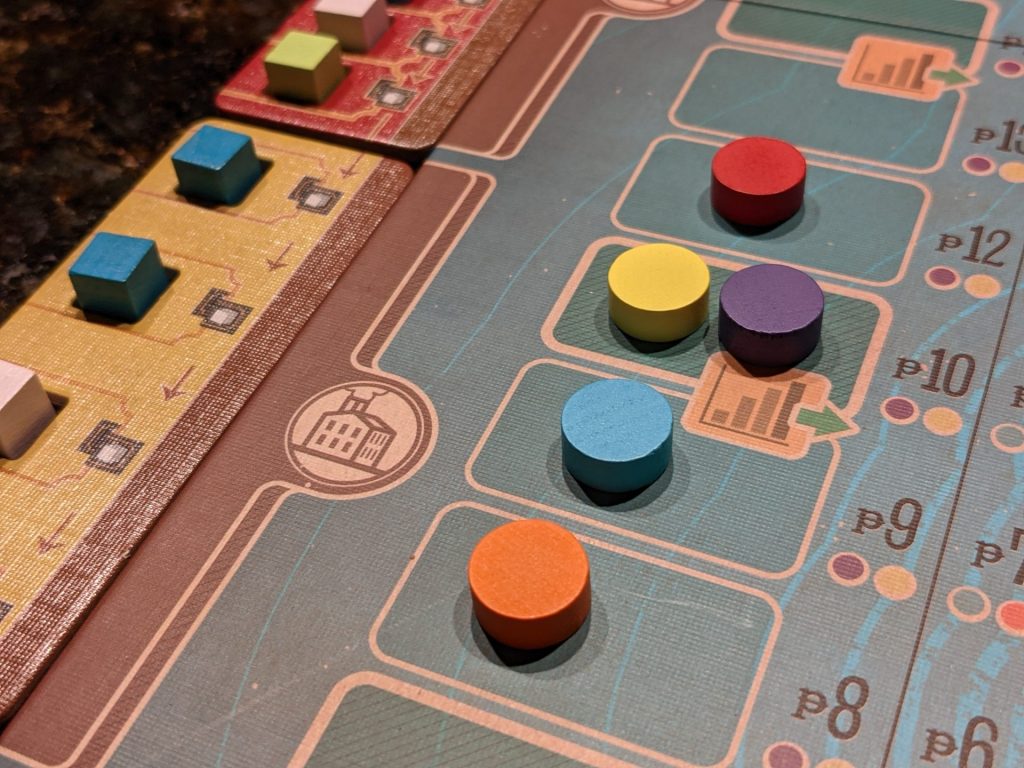
My Experience with “Train Games”
I’m the kind of gamer that will try anything, but if you look at my collection, it certainly leans into medium-weight games that are a mix of “interactive”/confrontational affairs and Euro/efficiency designs. I also own a few lighter two-player-only games and large-group party games, with a smattering of what we’ll call “heavy” and more strategic games.
One thing about my collection is consistent: I can finish almost all of my games in under two hours. And, almost all the games feature the hallmark of my preferred playstyle: I don’t do downtime. For example, Hansa Teutonica: Big Box is one of my all-time favorite games, in part because there are interesting decisions to be made and you can whip out a turn in under a minute.
18XX games, then, faced a tall order when I first jumped into the pool. The games simply can’t be played in person in less than three hours, and often, they are much longer than that. (We’ll cover one way around that later in this article.) And what about downtime? With a full complement of six players, you might be staring down massive amounts of waiting.
One thing surprised me about that last point. As an investor in various corporations, players are always watching everything in 18XX games. This is a good thing. My initial fears were that I might run my train line first, then wait 30 minutes to do anything interesting. My findings have differed. My turn might take a minute or two, but then I have to start planning for what I’m going to do in the next operating round to increase my revenues, or consider how to upgrade a piece of track to connect to another city, or think about how much money I need to withhold in a future operating round to buy a train two turns from now.
There’s a lot going on in 18XX games, and while it’s not necessarily brain burner material, it’s enough to require my brain enough time to process after a game is over. Decompression is real, people!
My experience with “train games” coming into this was fairly light. I’ve reviewed Iberian Gauge, played other “Iron Rails” games such as Irish Gauge and “cube rails” games such as Chicago Express and Age of Steam. Imperial Steam is a bit longer and heavier than those games, but it rests on the same premise of building a line and managing a lot of economic choices with shareholders.
One game I adore that is 18XX-adjacent: City of the Big Shoulders. You’ve got the stock game, the economics required to run an efficient business while players can invest in your company using a partial capitalization method (companies in City of the Big Shoulders “float” as soon as someone puts 20% down to start a company), but the operating rounds in City of the Big Shoulders involve buying goods and running factories. It’s similar, but not the same, as an 18XX game but can be played in about three hours instead of five.
So, how are the games? I’ll have full reviews of many of these in the months ahead, but here is a taste of what I am working on.
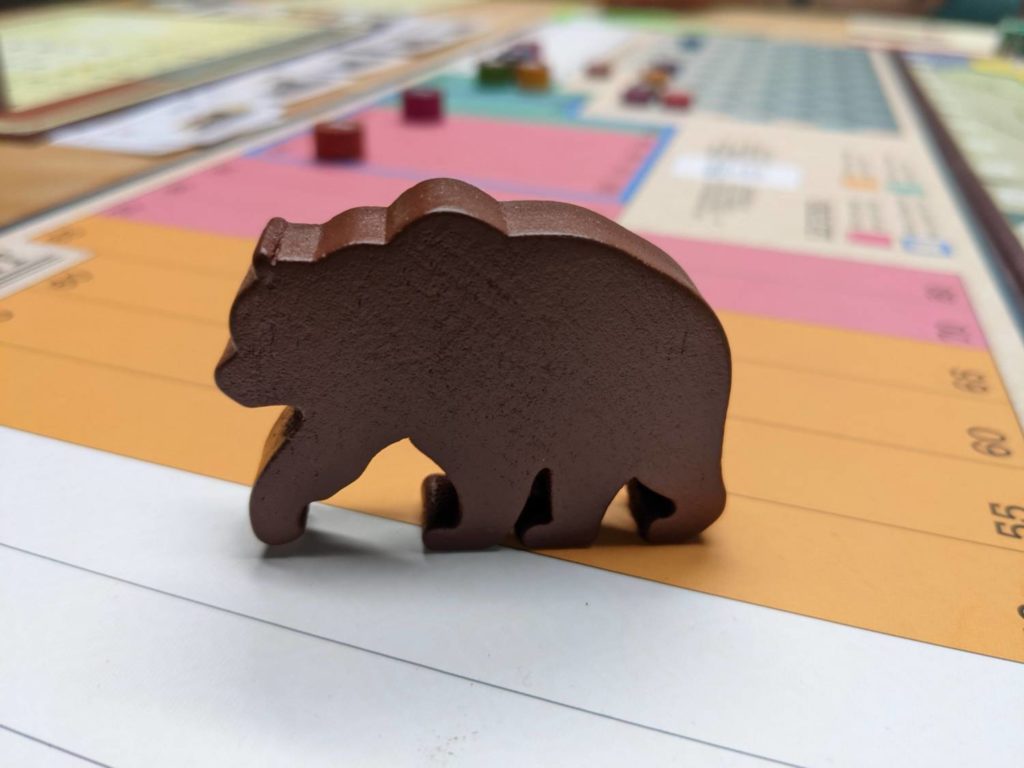
1861: Railways of the Russian Empire & 1867: Railways of Canada
For my very first official 18XX game, I went with a game I purchased back in the summer of 2021. That game is 1861: Railways of the Russian Empire (as a part of the big box that also includes 1867: Railways of Canada).
The games, designed by Ian D. Wilson with updated art by Karim Chakroun, are built to include lots of ways to approach the 18XX system. You’ve got private companies, minor companies, major companies, mergers, and even the national railway constantly threatening to gobble up the minor companies that are not successful. There’s even a variant called 1861S which can be used for those of us not quite ready to play a 5-hour game the first time around!
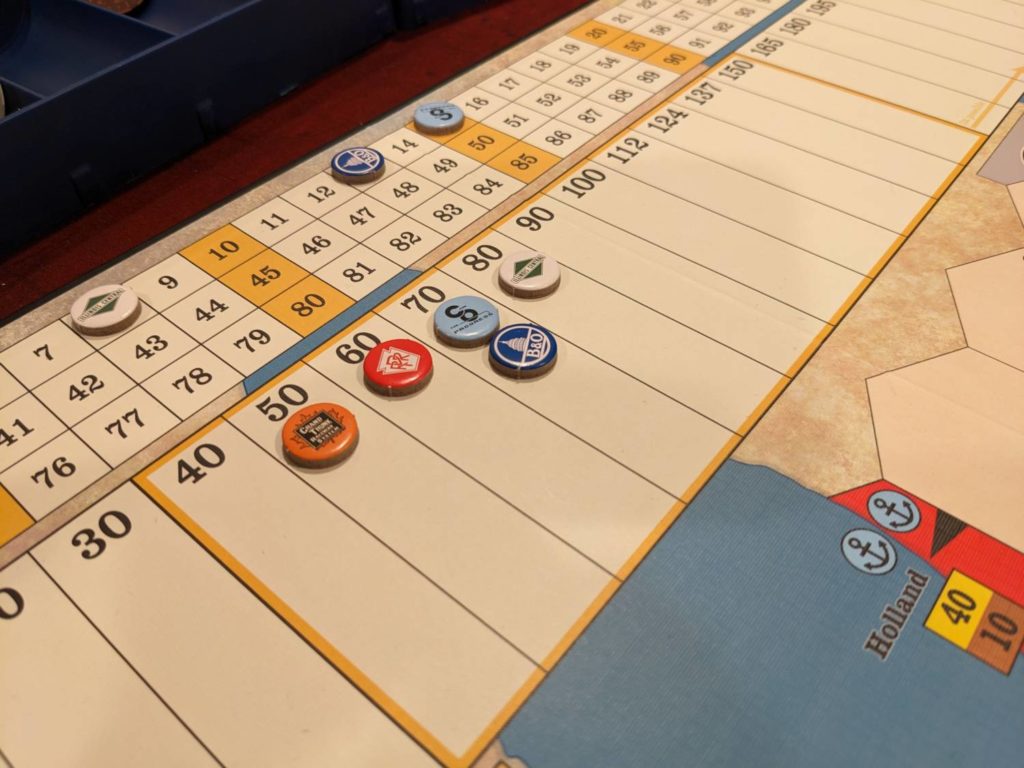
1846: The Race for the Midwest
Of all the 18XX games I was lining up for this article, the one I was most excited about was 1846. 1846 was designed by Tom Lehmann (Race for the Galaxy, Res Arcana), and while Lehmann has designed two other 18XX games—1833NE and 2038: Tycoons of the Asteroid Belt—1846 was the game many sources felt was the signature experience for new 18XX players.
1846 simplifies many 18XX elements. Privates are drafted to begin play. The stock tracker is easy to read. It is difficult to tank someone else’s company, which (hopefully) means that more games of 1846 don’t end with players getting dunked by players trying to manipulate the market solely for the purpose of destroying other players. Trains don’t rust in 1846 like they do in other games. but they do “phase out.” This means that when one of your trains is set to rust, you still get to use it one last time before it exits play for good.
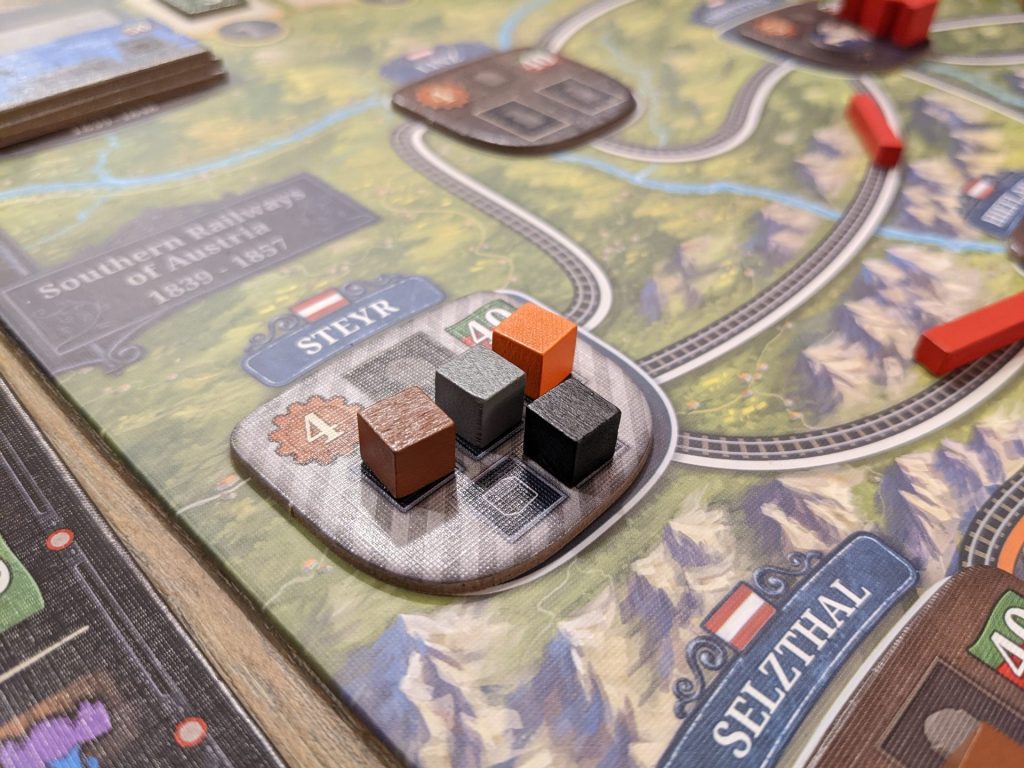
1830: Railways & Robber Barons
1830 is the “OG” of the 18XX series, but I intentionally didn’t start with this game. One read of the rules told me that 1830 is actually not very friendly to new players.
Now that I’ve tried 1830 a few times online, I’m excited to get my physical copy in front of friends. My main issue with 1830 is the length, but that is remedied by the ability (in person, at least) to shrink the overall size of the bank pool. This could make the game much shorter, or much longer, depending on player preferences.
I see why so many people think 1830 is a great game to start with, because it allows players to see the 18XX system in its true light. The game slowly reveals itself over multiple turns. The map features lots of places where players can be cut off, killing their chances of victory without making some major pivots. The private company auction can have big consequences on subsequent phases. The way trains rust can be crippling if players do not time train obsolescence correctly, and moving trains between corporations can be really exciting for a good planner.
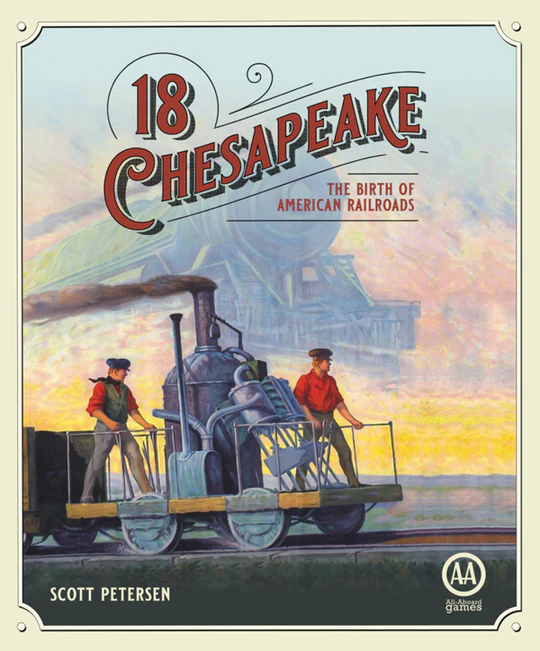
18Chesapeake
By most accounts, 18Chesapeake is meant to be one of the more straightforward 18XX experiences for a new gamer. (While I would like to try this game in person, it is also the most expensive of the physical copies I considered adding to my collection. Therefore, I’ve only played this one online.)
But my plays have yielded interesting findings. I thought 18Chesapeake was actually “stabbier” than even 1830; understanding turn order and mechanics to change that turn order are vital when racing to certain key spots on the map, maybe none more so than Washington, DC or Baltimore. The privates aren’t as interesting, and train prices ramp up in a way that makes timing the buys crucial to end-game strategy.
I’m glad I tried this one (three games online), but I’m anxious to revisit it with a physical production.
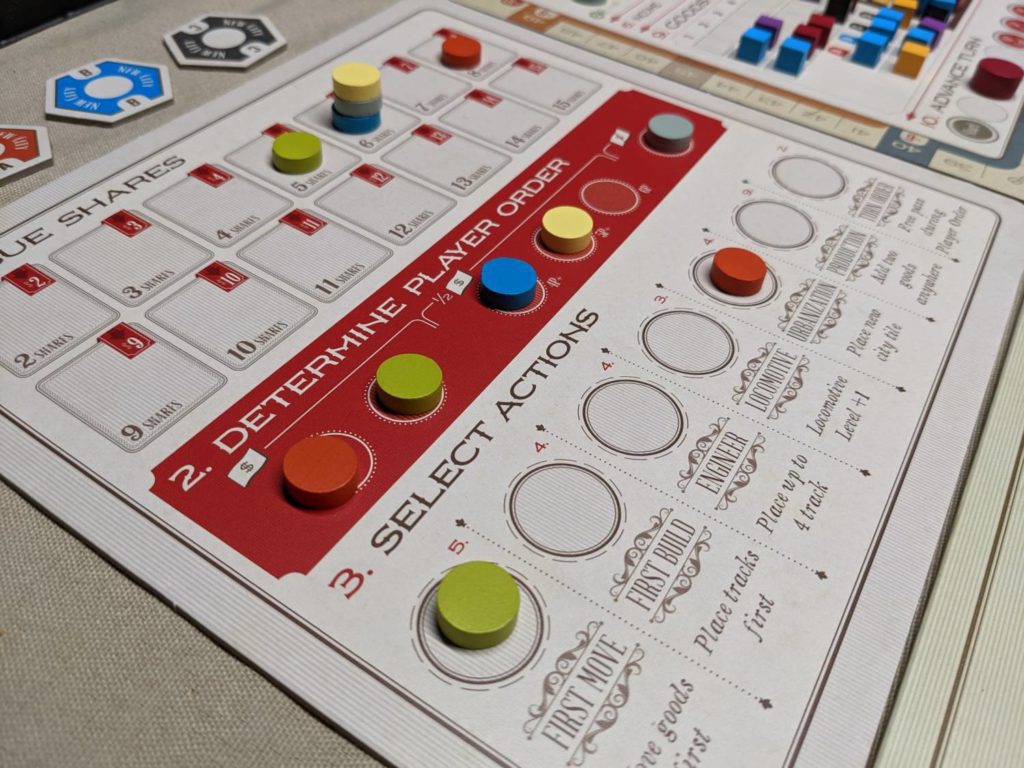
18MS
After all the games I tried in this journey—including single-game dabbles into 18NewEngland, 1822MX and 1880: China—I followed the advice of a couple sites online as well as 18xx.games to try 18MS (the MS stands for Mississippi).
This much is now clear to me: 18MS is far and away the best way to learn the 18XX system.
That’s because 18MS is so incredibly friendly to new players. It features a very small map, limits play to four players, it always has the same five major corporations in play, and the game has exactly ten operating rounds. Trains rust at specific times in the game, not when new trains are bought like in most 18XX games—and when trains do rust, players get a “salvage” fee to partially compensate for the loss.
Players can even buy trains with a mix of company funds and personal cash if they want to add a new train to a corporation’s pool, for a small additional fee. (Normally, players are not allowed to mix personal funds with corporate funds unless there’s an emergency train purchase.)
18MS is a home run for new players and now that I have played it four times, I am going to add a physical copy to my collection. It’s also a game that I could see playing in under two hours with experienced 18XX players.

Online Play: 18xx.games
I’m a huge proponent of websites like Board Game Arena, in part because sometimes I want to play favorites like Beyond the Sun but can’t get anyone to play in person with me.
Board Game Arena doesn’t have 18XX games. Enter 18xx.games.
Created by Toby Mao as a way for gamers across the world to play their favorite 18XX titles, this site is a godsend for players who want to try out a bunch of games for free in an environment that seems pretty welcoming to new train gamers.
Over the course of more than 20 live and async games in preparation for this review, I now have a different thought. Strangely, and maybe sadly, 18xx.games is the best and only way I can recommend playing 18XX games. That’s because there are always available opponents, and all the math that needs to be done in an 18XX game is done for you.
I can’t stress how much time is saved by playing 18XX games on 18xx.games. I’ll give you one brief example, but that example easily applies to every game I have tried.
I did a live play of 1846 recently. At the time, I was unemployed, so I had 3-4 hours to burn while sitting at my personal laptop on a random Friday morning. Another player set up the lobby, then we went about drafting private companies, buying stock, and operating corporations.
The game was set up in seconds, then each of the four players in the game quickly drafted starting private corporations. Then every facet of the game was a breeze. Buying shares to float a company was quick, and 18xx.games does some math for you by telling a player how much each company’s par price equates to how many shares of the company you can afford with your starting cash.
Placing tiles is a cinch. Clicking on any available hexes or previously-placed tiles brings up a radial that offers all of the available tile choices (including the requirement in later rounds when upgrade tiles in green, brown and gray can be placed). Then, when running train routes, games that were set with the Auto Routing feature allow for players to have the AI run models in the background to see which route pays the most money.
Money, indeed.
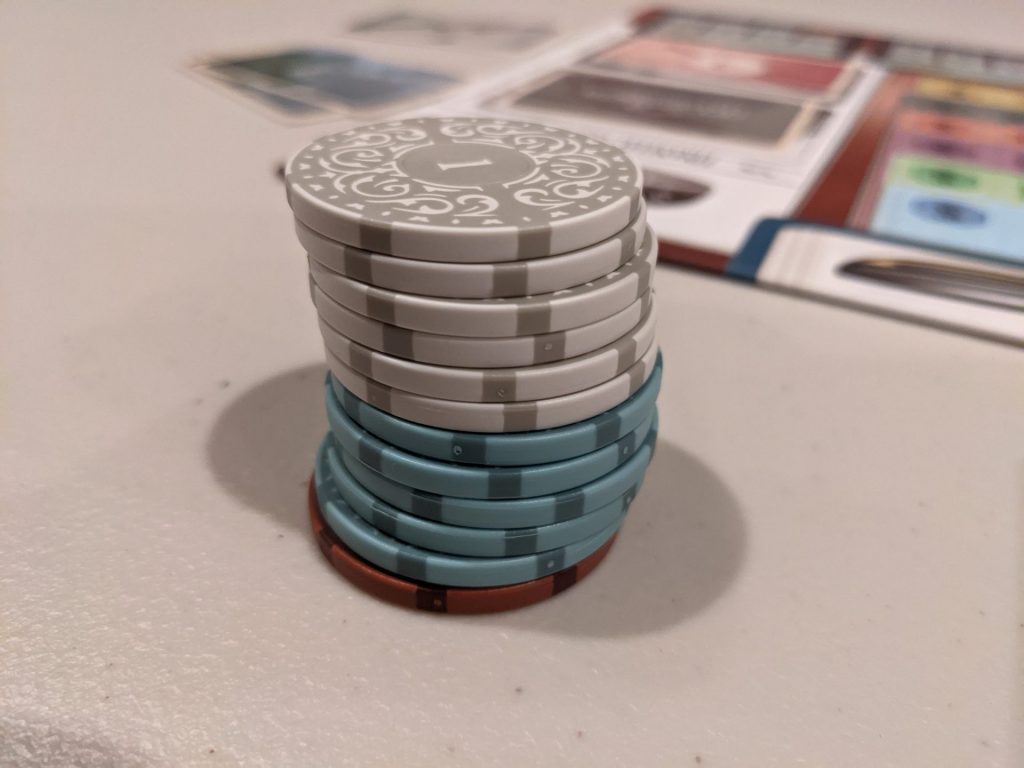
The Auto Routing feature alone will save the table 30-60 minutes over the course of a full game. You just don’t use your brain at all here; plus, no one can argue with the results, and no one can question whether or not you cheated your way to an extra $10 based on a math error made in person. It just works, then play passes to the next player to run their corporation’s routes.
Our total game time: two hours and 40 minutes. In person, that could have been a four-hour experience.
18xx.games feels like playing a game through your Netscape Navigator browser in 1997—it’s not sexy, but it does the things it needs to. The chat function does the job, and when I had questions for other players, those questions were answered quickly. The stock phase transactions are not that much faster online than they would be in person, but when the operating rounds start up, play speeds up immediately.
The sheer number of titles available on 18xx.games is staggering. There are always sessions available to join featuring the most popular games, which in my experience are 1830, 1846, 18Chesapeake, 1817, Shikoku 1889, and 1862. In fact, if you only wanted to play those six titles, you could join a new async session of any of those every day of the year.
But then, if you wanted to try something different, there are 58 other titles available on the site. Amazing!! And 18xx.games is such an easy site to navigate, with a helpful tutorial for new players and rules linked within each game.
It’s the ideal way to play 18XX games. My sense is that games are better online than in person purely for the efficiency of the time investment. The haptic sensation of poker chips, moving tiles, and outbidding competitors by screaming your face off? Yeah, I love that too. But I’ve already completed more games online than I will in person the rest of this year by a long shot.
My 18XX Series: What’s Next
I’ll post reviews of 1846, 1830, 1861, Shikoku 1889, 18MS, and 1880: China in the months ahead. (1880: China is already giving me good vibes, despite only a partial first play under my belt.) If I can get publishers to agree to send me more titles, I will do my best to get them to the table.
In the meantime, I’m going to continue learning more about the 18XX system and trying to meet other fans. There are many game groups in my local area (Chicago), so hopefully I can connect with more players who have experience and a large collection of these games so I can try them out with dedicated fans.
Do you have any suggestions for great games friendly to new players? If so, please leave those in the comments below!


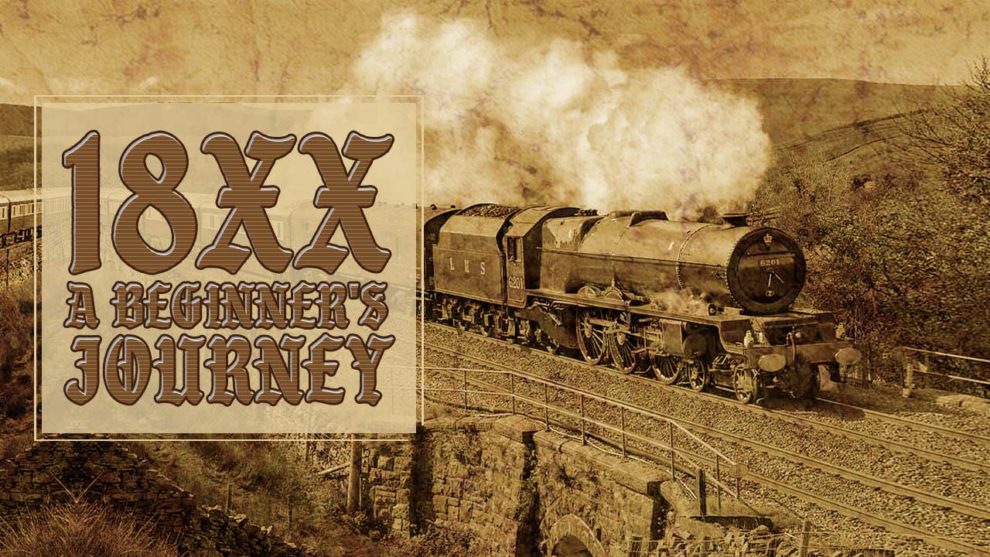










Great article! I’ve never tried an 18XX game, so I was especially interested in the discussion of 18MS. Also, I highly recommend No Pun Included’s video on 18XX – https://youtu.be/QErygzM4W_Y
I have had been itching to play an 18xx for a few years. I went to chattanooga rail gaming challenge and learned to play there (on 18ms). Now I just need a few people in my area for in person. I love the idea of online but for me in person is what I prefer.
Hey Justin,
Fantastic article! I was on the fence about trying these games but I think you’ve convinced me to give them a go!
Excellent article and entertaining read. Thanks for taking the time to thoroughly break down your experience!
Thanks, Jeremiah! It’s been fun learning many of the games in the 18xx space. Stay on the lookout for more coming soon; I’m still hoping to do at least one review per quarter in 2024.